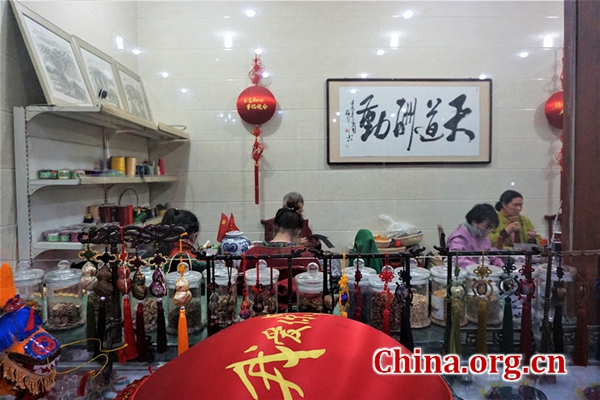Scented sachets and the flourishing rural cultural industry
- By Wang Yiming
 0 Comment(s)
0 Comment(s) Print
Print E-mail China.org.cn, January 24, 2020
E-mail China.org.cn, January 24, 2020

On the eve of the Spring Festival of 2020, Wang Xiuying, 81, is still busily threading needles in her sachet workshop in Mazhuang village of Xuzhou, east China's Jiangsu province. Wearing reading glasses, this silver-haired craftswoman is absorbed in sewing an herbal sachet with the Chinese "Fu" character meaning blessing.
She explained: "Scented sachets have a history of thousands of years. People used to sew and wear sachets on traditional festivals like Dragon Boat Festival and Spring Festival to repel insects, ward off evil spirits and hope for a happy life."
Scented sachets, or "fragrant bags," are small cloth bags filled with Chinese herbal medicines, potpourri or aromatic ingredients and embroidered with colorful patterns. It was listed as a national intangible cultural heritage in 2008.
Wang started to learn about making handicraft items, including herbal sachets, from her grandmother and mother in her early teens. "Years ago, she sewed sachets just out of interest and passion. She would give them to relatives and friends. Later on, she designed and sewed so much that I have to help occasionally sell them at temple fairs," said her son, Sun Jian.
With superb craftsmanship after decades of practice, ingenious designs with local characteristics, as well as the help of her son and daughter-in-law who have studied design, her "Mazhuang-style sachets" have gained great popularity. In 2006, sachets she designed with a pattern showing the 12 zodiac animals sold for a high price of 1,000 yuan ($144).
More villagers flocked to become her apprentices out of for interest or to supplement their family income.
She said: "From designing, drawing, making demonstration models, selecting fabrics and herbs, to the techniques of sewing and filling cotton, I'm willing to share with fellow villagers so that we can preserve this intangible cultural heritage together and everyone can share the economic pie."
In 2013, she was named the inheritor of an intangible cultural heritage at the municipal level. However, she might not have expected that one day her sachets would even be sold to President Xi Jinping.

President Xi, also general secretary of the Communist Party of China (CPC) Central Committee and chairman of the Central Military Commission, made an inspection tour in Xuzhou on Dec. 12, 2017, during which he visited Mazhuang and met with villagers including Wang Xiuying.
She clearly recalled that day, "President Xi Jinping praised the scented sachets I made as highly exquisite. He bought one to support my business and encouraged me to keep on with this handicraft. I was very excited and touched."
Wang Xiuying's flourishing sachet business is not without reason. It boomed against the backdrop of the development of the rural cultural industry and the transformation of Mazhuang Village.
Xuzhou, of which the village forms a part, used to nurture its economy by coal for more than 130 years, leaving behind a vast area of abandoned coal mines, slag heaps and industrial garbage. In recent years, the local government shifted its industrial focus from coal mining to eco-friendly development.
A Pan'an Lake Wetland Park was built on the land that once had been scarred by collapsed coal mines exhausted by a century of extraction.
Taking advantage of booming tourism, the folk cultural industry in Mazhuang village rapidly took off. Herbal sachets are a case in point.
"After the opening of the Pan'an Lake Wetland Park in 2012, my mother was invited to open this workshop there, selling herbal sachets as souvenir. In recent years, as more people visit the park, the sachets sell even better. After President Xi bought one of our sachets, the revenue even doubled. Now, demand largely exceeds supply," Wang Xiuying's son said.

In order to develop this cultural industry and promote its integration with the development of rural tourism, the Mazhuang Village Committee transformed an abandoned old plant into a special sachet workshop covering an area of more than 2,000 square meters, integrating the functions of sachet production, designing, display, sales, and experience. It was officially put into use in October 2018.
Li Huiqing, head of the workshop, said: "Making sachets produces jobs. Over 50 people now work in the workshop every day. Counting the people who sew at home, more than 3,000 people in Mazhuang and surrounding village have participated in sachet production."
"The sachets are sold both online and offline. Customers can customize the styles and logos, or buy them in our Taobao store. A steady stream of tourists ensures a decent revenue for us," Li added. It is reported that, last year, Mazhuang received 800,000 tourists with sachet sales exceeding 10 million yuan.
Craftsmen represented by Wang Xiuying have injected new life into scent sachets, a millennium-old handicraft. The rural cultural industry has also developed during this process. "No matter how large the order is, we should always make fine products and ensure the quality, " Wang Xiuying said earnestly.






Go to Forum >>0 Comment(s)